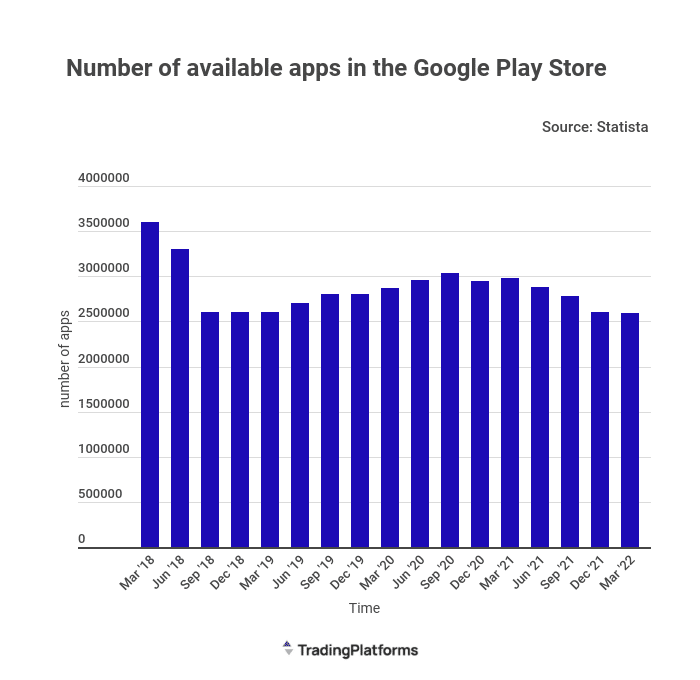There are fewer applications in Google’s Play Store today than four years ago. That came out in a recent tradingplatforms.com analysis. The site presented data showing that the store’s app numbers had fallen by a million.
Google Play Store hosted 2,591,578 applications by March this year. This figure is a 28% drop from the 3.6 million apps that the platform held in March 2018. The decline is due to Google’s periodic purges of apps violating its terms of service. Some of them were malicious intruding into users’ privacy and compromising their security.
Commenting on the development, tradingplatforms.com’s Edith Reads said, “Google owes its customers the duty to protect. Its Play Store is teeming with apps that could interfere with the proper functioning of users’ devices. Some could even jeopardize the security of users who download them. This reality makes such cleanups inevitable.”
Protecting users
Google sets standards that developers wishing to list their apps on its store must adhere to. These include their commitment to adhering to its user data policies. Those policies stress transparency in how those apps interact with users’ data. The threshold is higher for any apps handling sensitive and confidential information.
The firm uses a two-pronged approach to ensure compliance with its listing terms. Beginning in 2015, it uses a combination of human reviewers and AI tools to flag malicious or non-compliant apps. It then bans any apps that are in serious violation of its terms.
The apps store comes with the Google Play Protect feature. This software scans all apps for threats alerting Google’s engineers to step in if needs be. It also follows a peer grouping policy. Here it groups and compares attributes of apps with similar attributes for easy monitoring.
Google Play isn’t the only app store around
Google Play’s almost 2.6M Android apps listing makes it the largest app store in listing terms. Following in the second spot is the Apple App Store. This one has over 2.3 M applications for devices running on the iOS technology.
Notwithstanding the dominance of the two, other app stores are also jostling for market share. For instance, the Amazon App store supplies its customers with about 500K android apps. Its best-sellers are in utilities, gaming, and education.
China’s third-party app stores
Additionally, the Chinese app market is bursting with third-party Android stores. They include Tencent’s app store, which hosts nearly 44K apps.
Google Play rebranded from Android Market. It offers users a rich selection of books, digital media, entertainment, and utility apps. While these come either as paid or free versions, the free ones dominate


Question & Answers (0)